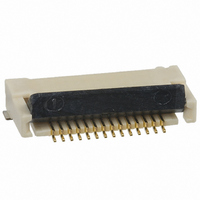XF2M-2015-1A-R100 Omron, XF2M-2015-1A-R100 Datasheet - Page 24

XF2M-2015-1A-R100
Manufacturer Part Number
XF2M-2015-1A-R100
Description
CONNECTOR FPC 20POS 0.3MM SMD
Manufacturer
Omron
Series
XF2Mr
Datasheet
1.XF2L-0725-1.pdf
(28 pages)
Specifications of XF2M-2015-1A-R100
Connector Type
Top and Bottom Contacts
Number Of Positions
20
Pitch
0.020" (0.50mm)
Ffc, Fcb Thickness
0.30mm
Height Above Board
0.083" (2.10mm)
Mounting Type
Surface Mount, Right Angle
Cable End Type
Straight
Termination
Solder
Locking Feature
Rotary Lock, Backlock
Contact Finish
Gold
Contact Finish Thickness
5.9µin (0.15µm)
Operating Temperature
-30°C ~ 85°C
Current Rating
0.500A
Voltage Rating
50V
Housing Material
Liquid Crystal Polymer (LCP)
Lead Free Status / RoHS Status
Lead free / RoHS Compliant
Features
-
Other names
XF2M20151AR100
24
XF
4. When unlocking the slider (lever), place your fingers on
5. When inserting and removing the FPC, be sure to check
Using the FPC in the follow ways may damage the FPC,
either side or the entire slider (lever) and slowly lift the
slider (lever) up and away.
Do not engage the slider (lever) past its initial location
during the unlocking process. Doing so may result in
damage to the connector or contact failure.
Performing the following action may cause the terminals
to change shape or otherwise cause contact failures.
that the slider (lever) has been unlocked first.
change the shape of the contacts, or result in contact fail-
ure.
• Using tweezers to unlock the slider (lever).
• Removing the FPC when the slider (lever) is still locked.
Primary location
6. Make sure that the FPC has been inserted correctly and
Mounting
1. Do not perform reflow or manual soldering with the FPC
2. The reflow conditions are as stated in OMRON’s specifi-
Designing
1. Gently pull out the FPC taking care not to apply force
2. When installing the FPC at a location or on equipment
3. Use the FPCs that conform to the appropriate specifica-
4. Use the same metal for the FPC plating and the connec-
5. “Whiskers” may protrude from the FOC film of some lead-
6. When designing the board, be sure to allow locking and
7. Make sure that the metal mask thickness is within the
not backward.
aligned with the customer's design specification may
damage the contacts and equipment may malfunction.
inserted in the connector and the slider (lever) in the
locked position. Doing so may result in contact failure.
cations and guidelines. These conditions, however,
depend on the type of solder, the manufacturer, the
amount of solder, the size of the circuit board, and the
other mounting materials. Confirm the mounting condi-
tions before proceeding.
directly to the connector. Bending the FPC in the area
where it enters the connector or applying force to the FPC
itself may result in contact failure.
that will subject the FPC to repeated vibration or move-
ment, secure the FPC prior to use.
tions and size as stated by OMRON. When using a differ-
ent FPC, or an F/F, contact OMRON.
tor plating.
free FPCs. Be careful when using these units.
operating space for the slider (lever).
appropriate specifications and size as stated by OMRON.
The recommended metal mask open area is 90% of the
printed circuit board mating dimensions given in the
dimensions diagrams.
• Removing the FPC by pulling it up and down or from left
Inserting the FPC incorrectly with the connecting face not
to right or twisting it sideways.
Component
XF











